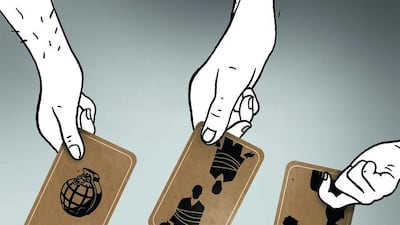Even when Libya takes faltering steps forward, these only appear to highlight how far the North African state still has to travel. Rebuilding a functioning state after decades of tyrannical mismanagement by the Qaddafi clan was never going to be easy, but the weakness of the central government is inhibiting even limited progress.
This weakness was on display this week in two separate, but related, incidents. First was the adjournment of the trial of Qaddafi’s sons and officials in Tripoli. Seeing once feared men like Abdullah Al Senussi, formerly Muammar Qaddafi’s spy chief, hunched in blue prison outfits behind bars in court must have provided Libyans with some satisfaction.
But missing from the rows of defendants was Saif Al Islam, Qaddafi’s son, who is still in a prison in Misurata, in the east of the country. The militias who hold Mr Qaddafi have no intention of releasing him to the central government in Tripoli, for fear of losing a significant bargaining chip.
The same reasoning lies behind the kidnapping, on Tuesday, of Jordan’s ambassador in the country. Fawaz Al Itan was taken by masked gunmen in the capital. In a phone call, his captors demanded an Islamist militant be set free in return for Mr Al Itan’s release.
Such kidnappings have become common since the end of the Qaddafi era. Officials, businessmen and their families have been kidnapped as various militias seek bargaining chips. Such is the weakness of the central state, that even the prime minister is not safe: on Sunday, Abdullah Al Thinni, in office just four weeks, stepped down after he and his family were attacked by a militia.
The revolution has devolved into competing militias, scrabbling to acquire as much power as possible, each playing the best cards they have, often captured officials. The longer this state of affairs continues, the more fragmented Libya will become, to the detriment of all.
Libya needs a comprehensive agreement that disarms the militias in return for the protection of a central army and a seat at the political table. That will not be easy, especially with a weak government in Tripoli. But the rewards are considerable: the sooner there is stability, the sooner the oil of Libya can be used to make the people prosperous and the sooner the country will become a functioning part of the international community.

